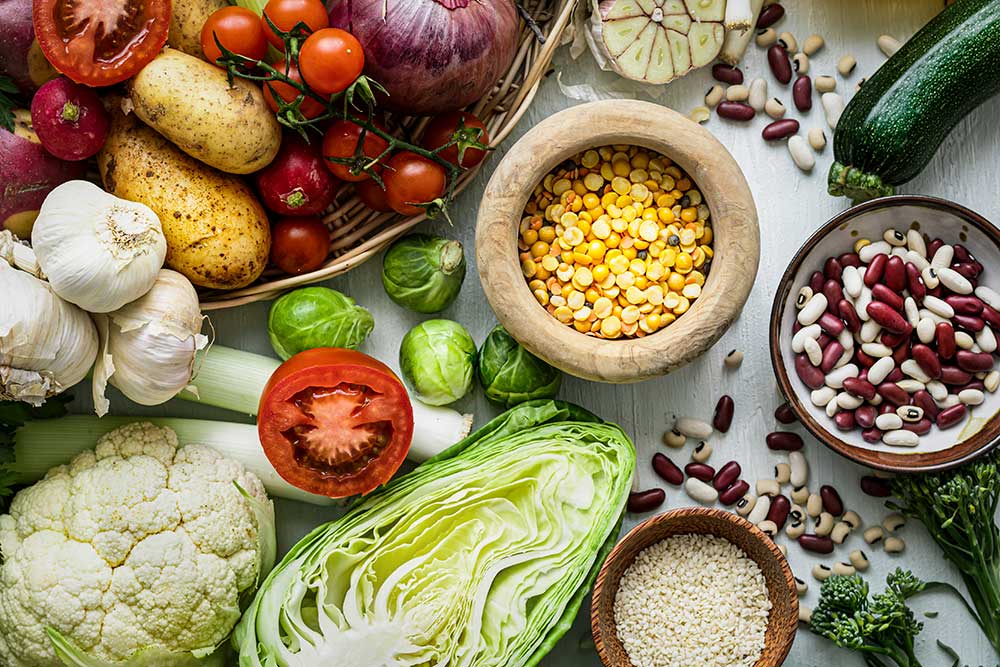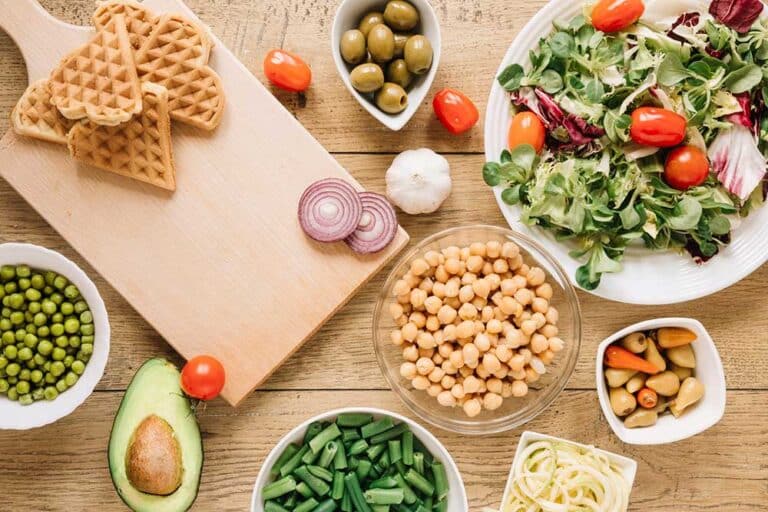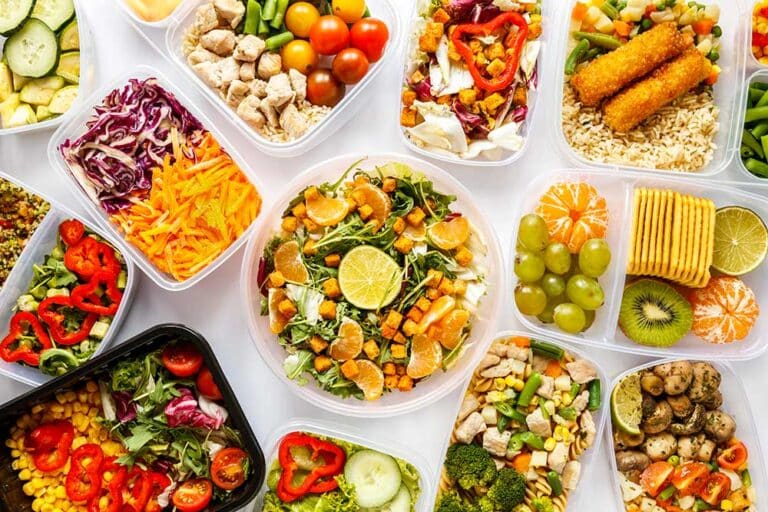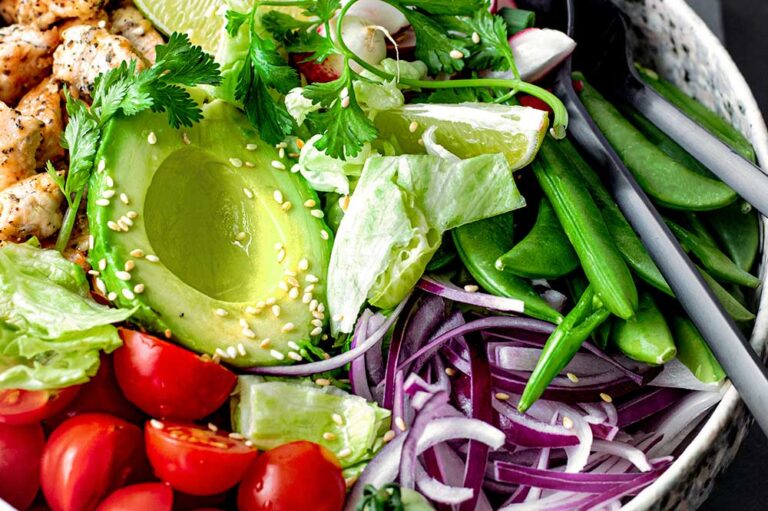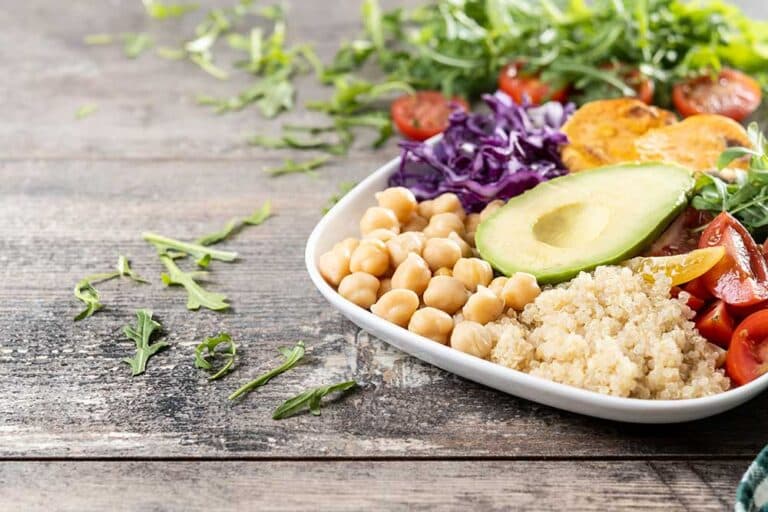Plant-Based Diet Overview
Understanding Plant-Based Diets
A plant-based diet focuses on foods primarily derived from plants, including fruits, vegetables, nuts, seeds, oils, whole grains, legumes, and beans (Harvard Health Publishing). This diet doesn’t necessarily mean eliminating meat or dairy entirely but rather emphasizes choosing more foods from plant sources. Many people adopt plant-based diets for a variety of reasons, including health, environmental benefits, and ethical considerations.
Benefits of Plant-Based Eating
Embracing a plant-based diet confers numerous health benefits. Studies have shown that vegetarian and plant-based diets can support overall health, offering a lower risk of developing coronary heart disease, high blood pressure, diabetes, and may contribute to increased longevity (Harvard Health Publishing). Furthermore, people following a plant-based diet often enjoy lower body weight, cholesterol levels, and reduced risks of stroke, cancer, and heart disease (Healthline).
In addition to mitigating the risk of chronic diseases, plant-based diets are linked to significant reductions in blood pressure. For those managing or looking to prevent diabetes, it’s noteworthy that plant-based diets can lower the risk of developing type 2 diabetes by 34 percent, due in part to the lower saturated fat content in plants compared to animal foods.
To explore more about the benefits of plant-based eating, visit our dedicated section. For those new to this dietary approach, our guide on how to start a plant-based diet offers practical tips and advice. And don’t miss our collection of plant-based diet recipes to get inspired in the kitchen.
| Health Benefit | Associated Reduction |
|---|---|
| Coronary Heart Disease | Lower Risk |
| High Blood Pressure | Lower Risk |
| Type 2 Diabetes | 34% Lower Risk |
| Stroke | Lower Risk |
| Cancer | Lower Risk |
| Cholesterol Levels | Lower |
For more insights, consider exploring our articles on plant-based diet for beginners and plant-based diet for athletes for specialized dietary strategies. With a plethora of delicious and nutritious high protein plant-based foods available, transitioning and thriving on a plant-based diet has never been easier.
Protein Sources on a Plant-Based Diet
For those following a plant-based diet, obtaining sufficient protein is a common concern. Let’s explore complete protein sources, protein-rich plant foods, and essential amino acids found in plants.
Complete Protein Sources
Complete proteins contain all nine essential amino acids that the human body cannot produce on its own. While animal proteins like meat, poultry, fish, eggs, and dairy are complete proteins, there are plant-based sources available too. Examples of plant-based complete proteins include:
- Quinoa
- Buckwheat
- Hempseed
- Blue-green algae (such as spirulina)
- Soybeans and their products, like tofu and tempeh
However, it’s important to note that these plant-based sources may not contain as much protein per serving as animal products (Piedmont Healthcare). For more information on incorporating these into meals, visit our section on plant-based diet recipes.
Protein-Rich Plant Foods
A variety of plant foods are rich in protein, making it easier for those on a plant-based diet to meet their nutritional needs. Here are some of the top protein-rich plant foods:
| Plant Food | Protein Content (per serving) |
|---|---|
| Seitan | 25g per 3.5 ounces |
| Tofu | 10g per 3.5 ounces |
| Tempeh | 15g per 3.5 ounces |
| Edamame | 17g per cooked cup |
| Lentils | 18g per cooked cup |
| Beans (kidney, black, pinto, chickpeas) | 15g per cooked cup |
| Quinoa | 8g per cooked cup |
| Hempseed | 9.5g per 3 tablespoons |
| Blue-Green Algae (Spirulina) | 4g per tablespoon |
Seitan, for example, is a rich source of protein and contains about 25 grams of protein per 3.5 ounces. It’s also a good source of selenium (Healthline). Similarly, lentils offer 18 grams of protein per cooked cup and are also high in fiber, folate, manganese, iron, and antioxidants, providing various health benefits. Beans contribute around 15 grams of protein per cooked cup and are packed with complex carbohydrates, fiber, iron, and several beneficial plant compounds (Healthline). To discover more high protein plant-based foods, explore our dedicated sections.
Essential Amino Acids in Plants
The human body needs nine essential amino acids to function correctly, and while complete protein sources provide all nine, many plant-based proteins don’t. However, by combining different plant foods, individuals can consume all essential amino acids. This concept is known as complementary proteins. Here are some combinations to ensure a complete amino acid profile:
- Beans and rice
- Hummus and pita bread
- Lentils and quinoa
Relying on a variety of protein sources helps maintain a balanced intake of essential amino acids. Those interested in the health benefits of specific foods can read more about the nutritional benefits of lentils and the power of beans in plant-based diets.
Considering plant-based diet benefits can encourage diverse food choices and a healthier lifestyle. Visit our article on how to start a plant-based diet for more information.
Specific Plant Protein Options
Seitan and its Nutritional Value
Seitan, also known as wheat gluten, is one of the richest plant-based protein sources, containing approximately 25 grams of protein per 3.5 ounces. It’s also a significant source of selenium. Seitan’s meat-like texture makes it a popular meat substitute in many plant-based diets.
| Nutrient | Amount per 3.5 oz (100g) |
|---|---|
| Protein | 25g |
| Selenium | High |
Tofu, Tempeh, and Edamame Benefits
Tofu, tempeh, and edamame are all derived from soybeans and are versatile components of a plant-based diet. They provide between 12 to 20 grams of protein per 3.5 ounces serving. Soy products are also rich in iron and calcium, essential for maintaining bone health.
| Product | Protein per 3.5 oz (100g) | Key Nutrients |
|---|---|---|
| Tofu | 12g | Iron, Calcium |
| Tempeh | 20g | Iron, Calcium |
| Edamame | 11g | Iron, Calcium |
Nutritional Benefits of Lentils
Lentils are a powerhouse of nutrition, offering about 18 grams of protein per cooked cup. They are an excellent source of fiber, folate, manganese, iron, and antioxidants, which contribute to various health benefits, such as improved digestion and cardiovascular health.
| Nutrient | Amount per Cooked Cup (198g) |
|---|---|
| Protein | 18g |
| Fiber | High |
| Folate | High |
| Iron | High |
| Manganese | High |
Lentils can be easily incorporated into soups, stews, and salads, making them an accessible and nutritious choice for those on a plant-based diet.
Power of Beans in Plant-Based Diets
Beans, such as kidney beans, black beans, pinto beans, and chickpeas, are rich in protein and complex carbohydrates. They provide around 15 grams of protein per cooked cup and are also high in fiber, iron, and various beneficial plant compounds.
| Type of Bean | Protein per Cooked Cup (172g) | Key Nutrients |
|---|---|---|
| Kidney Beans | 15g | Fiber, Iron |
| Black Beans | 15g | Fiber, Iron |
| Pinto Beans | 15g | Fiber, Iron |
| Chickpeas | 15g | Fiber, Iron |
Beans are a staple in many plant-based meal plans due to their versatility and nutritional benefits.
Fortified Nutritional Yeast and its Role
Nutritional yeast is a complete source of plant protein, offering about 8 grams of protein per half an ounce. It’s often fortified with essential minerals such as zinc, magnesium, copper, and manganese, and contains all B vitamins, including the vital B12, making it an excellent addition to a plant-based diet for beginners.
| Nutrient | Amount per 0.5 oz (14g) |
|---|---|
| Protein | 8g |
| Vitamin B12 | High (fortified) |
| Zinc | High |
| Magnesium | High |
| Copper | High |
Nutritional yeast can be sprinkled on various dishes, adding a cheesy flavor while boosting their protein content.
Incorporating these plant-based protein options into your diet can help ensure that you meet your nutritional needs while enjoying a variety of delicious and healthy meals. Explore more on high protein plant-based foods to diversify your diet.
Nutrients of Concern in Plant-Based Diets
Following a plant-based diet offers numerous health benefits. However, it’s essential to address some critical nutrients that may be challenging to obtain from plant sources alone. This section will cover the concerns related to Vitamin B12, creatine and carnosine, and the importance of Vitamin D3 and DHA.
Vitamin B12 Deficiency in Vegans
Vitamin B12 is mainly found in animal-derived foods, making it difficult for vegans to get enough of this crucial vitamin naturally (Healthline). Deficiency in Vitamin B12 can lead to serious health issues, including anemia and nervous system damage.
Vegans should consider consuming fortified foods, such as plant-based milk, cereals, or nutritional yeast. Another reliable option is taking Vitamin B12 supplements to ensure adequate intake.
| Food Item | Vitamin B12 Content (µg per serving) |
|---|---|
| Fortified Nutritional Yeast | 6 |
| Fortified Plant Milk | 2 |
| Fortified Cereal | 1.5 |
For detailed guidance on including Vitamin B12 in your diet, visit our article on high protein plant-based foods.
Creatine and Carnosine Sources
Creatine and carnosine are important for muscle function and are only found in animal-based foods. Vegans and vegetarians often have lower levels of these compounds. Creatine supplementation can help improve muscle mass and performance, while beta-alanine supplements can increase carnosine levels, enhancing muscle endurance (Healthline).
| Nutrient | Primary Source | Vegan Alternatives |
|---|---|---|
| Creatine | Meat, Fish | Creatine supplements |
| Carnosine | Meat | Beta-alanine supplements |
To further explore muscle maintenance on a plant-based diet, check out plant-based diet for athletes.
Importance of Vitamin D3 and DHA
Vitamin D3 and DHA are essential for bone health and brain function, respectively. Vitamin D3, typically found in fatty fish and fortified dairy products, helps in calcium absorption and bone growth. Vegans can opt for D3 supplements derived from lichen or consume fortified plant milks and juices.
DHA, an essential omega-3 fatty acid, is mainly sourced from fish. Algal oil supplements provide a plant-based alternative, ensuring that vegans receive sufficient DHA for brain health and cognitive function.
| Nutrient | Sources | Vegan Alternatives |
|---|---|---|
| Vitamin D3 | Fatty Fish, Egg Yolks | Algal Oil Supplements |
| DHA | Fatty Fish, Fish Oil | Algal Oil Supplements |
For more tips on maintaining a balanced plant-based diet, read our guide on how to start a plant-based diet.
By addressing these nutrients of concern, individuals following a plant-based diet can ensure they achieve optimal health while enjoying the benefits of plant-based eating. Investigating and integrating these essential nutrients helps maintain a balanced and nutritious diet.
Health Benefits of Plant-Based Diets
Impact on Heart Health
A plant-based diet rich in fruits, vegetables, whole grains, and legumes can significantly improve heart health. Studies show that eating a plant-based diet may reduce the risk of developing cardiovascular disease by 16% and lower the risk of dying from heart-related issues by about 31%. By cutting back on meat and focusing on plant-based diet recipes, individuals can enhance their heart health and potentially prevent serious conditions such as heart disease.
Relationship with Diabetes
Following a plant diet filled with high-quality plant foods may reduce the risk of developing type 2 diabetes by 34%. This could be attributed to the lower saturated fat content found in plants compared to animal foods (Everyday Health). Saturated fats have been shown to raise cholesterol levels and increase the risk of type 2 diabetes. By emphasizing plant-based diet benefits, individuals can manage their blood sugar levels more effectively and reduce their risk of developing diabetes.
Weight Management and Plant Diets
A plant-based diet can also play a significant role in weight management. A study found that individuals who followed a whole-food, plant-based diet for one year lost an average of 9.25 pounds, even without calorie restrictions (Everyday Health). This suggests that focusing on unprocessed plant foods can help with weight loss. For those looking to manage their weight, exploring a plant-based diet meal plan could be highly beneficial.
Below is a table summarizing the potential benefits of a plant-based diet on various health aspects:
| Health Aspect | Potential Benefits |
|---|---|
| Heart Health | Reduced risk of cardiovascular disease by 16%, mortality reduction by 31% |
| Diabetes Management | 34% lower risk of developing type 2 diabetes |
| Weight Management | Average weight loss of 9.25 pounds over one year |
For more detailed understanding and additional tips on starting this diet, check out our guide on how to start a plant-based diet.
By incorporating a variety of high protein plant-based foods, individuals can enjoy the numerous health benefits associated with this dietary approach. Whether the goal is weight management, improved heart health, or diabetes prevention, a plant-based diet offers a compelling and nutritious option for optimal health.
Comparison: Animal vs. Plant Proteins
Understanding the differences between animal and plant-based proteins is crucial for those following a plant-based diet for optimal health benefits. This section delves into the absorption, nutritional differences, nutrient profiles, and recommendations for diversifying protein intake.
Absorption and Nutritional Differences
Animal proteins are known as complete proteins because they contain all nine essential amino acids. In contrast, many plant-based proteins are considered incomplete as they lack one or more of these amino acids. However, certain plant-based foods like quinoa, buckwheat, soybeans, and chia seeds are complete proteins.
| Protein Source | Complete Protein | Essential Amino Acids |
|---|---|---|
| Animal Protein | Yes | All nine |
| Quinoa | Yes | All nine |
| Buckwheat | Yes | All nine |
| Soybeans | Yes | All nine |
| Beans | No | Some amino acids |
| Nuts | No | Some amino acids |
| Legumes | No | Some amino acids |
Nutrient Profiles of Animal vs. Plant Proteins
The nutrient profiles of animal and plant proteins differ significantly. Animal proteins are typically rich in certain nutrients like vitamin B12, creatine, and carnosine. However, they may also come with higher levels of saturated fats.
Plant-based proteins, on the other hand, are usually lower in saturated fats and cholesterol. They are rich in fiber, antioxidants, and phytochemicals, which contribute to numerous health benefits (Healthline).
| Nutrient | Animal Protein | Plant Protein |
|---|---|---|
| Vitamin B12 | High | Low |
| Creatine | High | Low |
| Carnosine | High | Low |
| Saturated Fat | High | Low |
| Fiber | Low | High |
| Antioxidants | Variable | High |
Recommendations for Diversifying Protein Intake
To ensure a well-rounded intake of essential amino acids on a plant-based diet, it’s vital to diversify protein sources. Combining different plant proteins can provide all the necessary amino acids. For instance, pairing beans with rice or nuts with legumes.
For those adopting a plant-based lifestyle, including a variety of high protein plant-based foods like lentils, tofu, tempeh, and nutritional yeast is recommended. Refer to our detailed guide on how to start a plant-based diet for more insights.
Incorporating a mix of plant proteins into weekly meal plans can mimic the amino acid profile of animal proteins while reaping the benefits of plant-based nutrition. For more ideas, explore our plant-based diet recipes.
For athletes following a plant-based diet, ensuring an adequate intake of all essential amino acids is particularly important for muscle repair and growth. Visit our section on plant-based diet for athletes for tailored advice.
Embracing a diverse array of plant protein sources not only supports muscle and overall health but also aligns with the numerous benefits of plant-based eating.
- About the Author
- Latest Posts
Johnnie D. Jackow Sr., the founder and CEO of Total Body Fitness, Worldwide, has a long-standing career in the fitness industry. He began as a certified personal trainer in the mid-90s and soon after authored his first weight loss book in 1998. This led to the launch of Total Body Fitness, Nationwide in the USA at the same time. Johnnie gained recognition as the fitness guru of his time, running infomercials on local TV late at night in Houston, Texas. Over the years, he has helped more than 40,000 individuals from all over the world achieve their health and fitness goals. With over 60,000 hours of documented training in integrative functional medicine, he completed his PhD in human physiology in 2010. His primary objective is to assist people in reaching their health and fitness goals through alternative approaches rather than relying solely on conventional medicine and pharmaceutical drugs. Today, with almost three decades of experience under his belt, Johnnie continues to be a leader in health and fitness.

